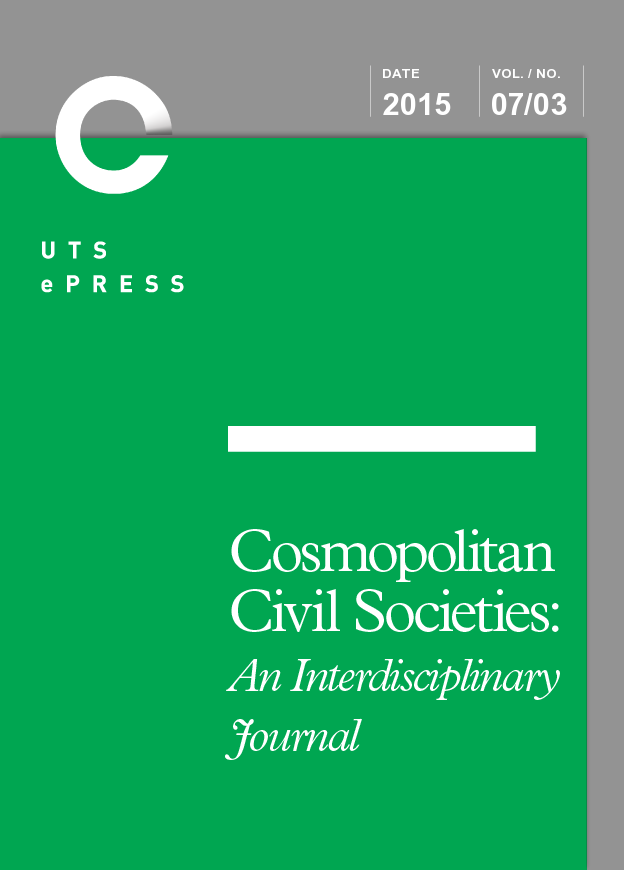The Production of the Indian Student: Regimes and Imaginaries of Migration, Education, Labour, Citizenship and Class
Main Article Content
Abstract
The so-called Indian student ‘crisis’ of 2009 and 2010 is often analysed in the context of how the violence against students challenged Australian multiculturalism and revealed both underlying racism and denial of racism in Australian society (see, for example, Mason 2012, Dunn, Pelleri & Maeder-Han 2011, Singh 2011). Some analyses further interrogate the incidents in relation to Australia’s relationship to India as one of its Asia-Pacific neighbours and key trading partners (Mason 2012). Yet there was a far wider context of global transformations to regimes of immigration, education, labour and citizenship that shaped the experience of Indian students in Australia leading up to and after the ‘crisis’ itself. The local context and local responses to the crisis are analysed thoroughly in other papers of this volume. What I seek to do in this chapter is to situate the very presence (and the subsequent vulnerabilities) of Indian students in Australia within several intersecting political, economic and cultural forces operating at national, regional and global scales. The focus of this paper is thus not on the violent incidents or their immediate consequences, but rather on the specific ways that transforming immigration and citizenship regimes, global labour markets, and global imaginaries of mobility and class facilitated Indian students’ mobility into Australia and shaped elements of their lives while they were here. In particular, I focus on how national mobility regimes, influenced by global processes, crafted and re-crafted the subjectivities of Indian students as by turns desirable and problematic.
Article Details
Issue
Section
Authors who submit articles to this journal from 31st March 2014 for publication, agree to the following terms:
a) Authors retain copyright and grant the journal right of first publication with the work simultaneously licensed under a Creative Commons Attribution License that allows others to share and adapt the work with an acknowledgement of the work's authorship and initial publication in this journal.
b) Authors are able to enter into separate, additional contractual arrangements for the non-exclusive distribution of the journal's published version of the work (e.g., post it to an institutional repository or publish it in a book), with an acknowledgement of its initial publication in this journal.
c) Authors are permitted and encouraged to post their work online (e.g., in institutional repositories or on their website) prior to and during the submission process, as it can lead to productive exchanges, as well as earlier and greater citation of published work (See The Open Access Citation Advantage Service). Where authors include such a work in an institutional repository or on their website (ie. a copy of a work which has been published in a UTS ePRESS journal, or a pre-print or post-print version of that work), we request that they include a statement that acknowledges the UTS ePRESS publication including the name of the journal, the volume number and a web-link to the journal item.
d) Authors should be aware that the Creative Commons Attribution (CC-BY) License permits readers to share (copy and redistribute the work in any medium or format) and adapt (remix, transform, and build upon the work) for any purpose, even commercially, provided they also give appropriate credit to the work, provide a link to the license, and indicate if changes were made. They may do these things in any reasonable manner, but not in any way that suggests you or your publisher endorses their use.
For Volume 5 No 3 (2013) and before, the following copyright applied:
Authors submitting articles to UTSePress publications agree to assign a limited license to UTSePress if and when the manuscript is accepted for publication. This license allows UTSePress to publish a manuscript in a given issue. Articles published by UTSePress are protected by copyright which is retained by the authors who assert their moral rights. Authors control translation and reproduction rights to their works published by UTSePress. UTSePress publications are copyright and all rights are reserved worldwide. Downloads of specific portions of them are permitted for personal use only, not for commercial use or resale. Permissions to reprint or use any materials should be directed to UTSePress.
